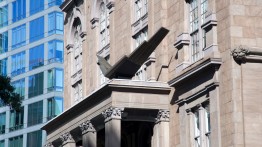Jeffrey Brown — A Force for Architectural Inspiration
POSTED ON: February 27, 2024

The Glider, from the 2012 exhibition Massimo Scolari: The Representation of Architecture, 1967 – 2012. Presented with generous support from Elise Jaffe + Jeffrey Brown.
The School of Architecture mourns the loss of our dear friend Jeffrey Brown, a man who never tired of being a student, finding joy and true excitement in listening deeply to architects, artists, and thinkers speak about their work, their discipline, their intentions, and motivations. He and Elise Jaffe, his wife and constant companion, valued and encouraged and generously supported the work of learning and teaching in all its forms at many institutions: public lectures, exhibitions, installations, catalogs, books, and films. Our school has been the beneficiary of their generosity and their friendship since 2004; for many years they directed their contributions to the Dean’s Circle discretionary fund—a measure of their trust in the School and their warm regard for our deans. One year, with Elise and Jeffrey’s support, the School installed a scaled reconstruction of Massimo Scolari’s 1991 Glider on the roof of the Foundation Building portico as part of an exhibition of Scolari’s drawings and models in Houghton Gallery. Perched on the outside of the historic structure as if ready for flight, the wings, which remained on the portico long after the run of the exhibition, reminded all who entered the building of the power, beauty, and mystery of architecture and art during a time of deep financial turmoil at the school.
In 2022, Elise and Jeffrey fully endowed the School of Architecture’s Student Lecture Series, which is curated and hosted by a small committee of students. Jeffrey was especially interested in learning from the students at Cooper, wanting to know whose work challenged them or inspired them, what work was important to deepening their understanding of architecture’s role at this time, and how they imagined an architecture of their future. Elise and Jeffrey attended many of the lectures; they took pleasure in the intensity of the students’ questions and would often join the students following the event for informal conversation with the speaker over a shared meal. Their interest in the students’ point of view was a measure of their own commitment not just to architecture, but to the education of architects, to the future of architecture, and to the School’s community.
We will forever miss Jeffrey’s belief in the importance of architecture, and we mourn the loss of his quiet presence, his warmth and kindness, and the joy that he shared with Elise.
Elizabeth O’Donnell
Distinguished Professor Adjunct
__________________________
To the unknowing eye, Elise and Jeffrey might have appeared as curious bystanders or parents: seemingly anonymous audience members on reviews and in lectures. In fact, they have been anything but! And that has been a secret of their inconspicuous and longstanding presence within the discipline of architecture. They have served as guardian angels for a field in consistent need of support, encouragement, and infrastructure. Inspired by an endless and insatiable enthusiasm for architecture as a discourse, these two travelers have been seen commuting between many schools of architecture, including Cooper Union, strategically supporting experiments, explorations, and events over decades. Their uncanny anonymity has been their main arsenal, but their generosity eventually propelled them to an inescapable presence. Still, it has been their unswerving passion for granular intellectual developments that led them to participate in every significant evolution of the field.
Jeffrey Brown’s untimely passing has left us with a deep void—he and Elise have become our family, cheering us on as they would their own offspring, with endless support. It is no accident that my deanship at Cooper Union was so easy: it was with Elise and Jeffrey’s support that we navigated the financial crisis some eight years ago. But in the process of giving, they offered a friendship more enduring than any individual or institution could ask for. I think I speak for everyone at Cooper Union when I offer these words of condolence to Elise. You and Jeffrey have been and will remain an essential part of our community.
Nader Tehrani
Professor
__________________________
With the passing of Jeffrey Brown, the School of Architecture has lost a beloved member of our community, but his profound legacy of support and generosity remains. Over the years, Jeffrey’s steadfast commitment to the learning and teaching of architecture has enriched the lives of countless students and faculty members. Always alongside his wife, Elise, Jeffrey tirelessly championed the importance of architecture, contributing to the growth and development of every facet of the discipline through patronage and encouragement. During my time as acting dean, Elise and Jeffrey have displayed incredible generosity, most notably in supporting our Student Lecture Series, which they actively engaged with enthusiasm. Jeffrey’s gentle demeanor and warmth will be deeply missed. Yet, his lasting impact on our Cooper community will serve as a tribute to his kind, unwavering spirit and his dedication to architecture.
Hayley Eber
Acting Dean




